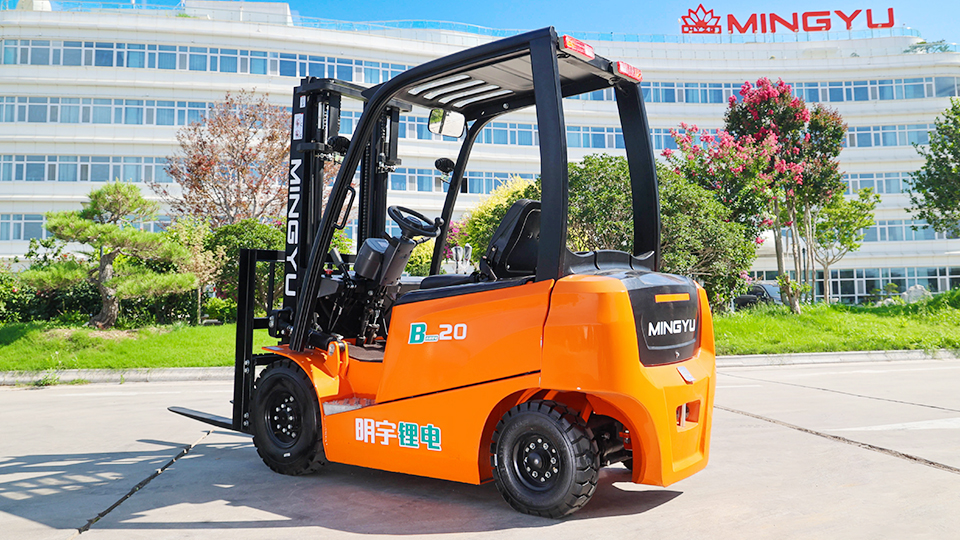
When it comes to choosing between electric and gas-powered forklifts, several factors come into play, including cost, performance, maintenance, and environmental impact. This comprehensive comparison will help you understand the key differences and similarities between these two types of forklifts.
How Electric and Gas Forklifts Work
Electric forklifts operate using rechargeable batteries, typically lithium-ion or lead-acid, which power an electric motor. This motor drives the forklift’s lifting and movement functions. Once charged, electric forklifts can operate for a set number of hours before needing a recharge.
Gas-powered forklifts, on the other hand, rely on internal combustion engines. Common fuel types include liquefied petroleum gas (LPG), gasoline, diesel, and natural gas. Propane lift trucks are particularly popular because they burn cleaner than diesel, making them more suitable for indoor use.
Pros and Cons of Electric Forklifts
Electric forklifts offer several advantages, but they also come with some trade-offs.
Benefits of Electric Forklifts:
Eco-friendly: Electric forklifts produce zero emissions, making them a cleaner option for warehouses looking to minimize indoor air quality issues.
Quiet performance: Electric lift trucks operate quietly, allowing employees to communicate more easily and improving overall productivity.
Lower operating costs: Electric forklifts often have a higher upfront cost but can save money over time. Recharging an electric forklift is typically more cost-effective than refueling a gas-powered one. These models also have fewer moving parts, requiring less maintenance.
Considerations for Electric Forklifts:
Higher initial investment: Electric lift trucks have a higher initial price tag. The battery and charging system costs can make electric models a bigger upfront investment.
Charging downtime: Electric forklifts require time to recharge once the battery is depleted.
Reduced performance in extreme weather: Electric forklifts can be sensitive to temperature extremes, which may decrease battery performance.

Pros and Cons of Gas-Powered Forklifts
Gas-powered forklifts also have their own set of advantages and considerations.
Benefits of Gas-Powered Forklifts:
Higher power and continuous use: Gas forklifts can handle heavier loads and work continuously without the need to recharge.
Fast refueling: Refueling a gas forklift is quick, reducing downtime compared to the charging time required for electric models.
Lower initial cost: Gas forklifts are generally more affordable upfront, making them an attractive option for businesses on a tight budget.
Considerations for Gas-Powered Forklifts:
Air pollution: Gas forklifts emit exhaust fumes, making them unsuitable for use in closed buildings or where air quality is controlled.
Noise and vibration: Gasoline engines produce more noise and vibration, which can affect the working environment.
Higher maintenance costs: Regular oil changes, filter replacements, and exhaust system inspections increase maintenance costs.
Cost and Maintenance Comparison
Upfront and Operational Costs:
Electric Forklifts: Higher initial costs due to battery technology and charging systems. However, lower long-term operating costs because electricity is cheaper than gasoline or propane.
Gas-Powered Forklifts: Lower initial purchase price but higher operating costs due to fuel expenses and maintenance.
Maintenance:
Electric Forklifts: Require less maintenance as they have fewer moving parts. Battery maintenance is essential, including regular checks on charging cycles and water levels for lead-acid batteries.
Gas-Powered Forklifts: Need more frequent servicing, including fuel system checks, oil changes, and filter replacements.
Power and Flexibility of Use
Best for: Indoor use, medium-duty tasks, and environments where noise and air quality are concerns.
Performance: Provide steady, controlled movements suitable for stacking and working in narrow aisles.
Gas-Powered Forklifts:
Best for: Heavy lifting, outdoor use, and rough terrain.
Performance: Better suited for consistent heavy lifting and long shifts.
Safety Considerations
Battery Handling: When handling lead-acid batteries, wear protective gear and follow emergency procedures to prevent acid splashes.
Charging Stations: Set up designated charging areas to prevent risks from fumes, electric shocks, and other hazards.
Gas-Powered Forklifts:
Exhaust Fumes: Operate in well-ventilated areas to avoid carbon monoxide exposure.
Refueling Safety: Refuel in designated safe locations, away from heat sources, and ensure only trained individuals handle refueling.
Choosing the Right Forklift for Your Business
Work Environment:
Electric Forklifts: Ideal for indoor operations where air quality and noise levels are important.
Gas-Powered Forklifts: Better for outdoor use or environments requiring heavy lifting and rough terrain.
Budget and Long-Term Cost:
Electric Forklifts: Higher upfront costs but lower long-term operating and maintenance costs.

Gas-Powered Forklifts: Lower initial purchase price but higher ongoing fuel and maintenance expenses.
Load Capacity and Performance Needs:
Electric Forklifts: Suitable for moderate to light loads and high-precision work.
Gas-Powered Forklifts: Better for heavy-duty tasks and continuous use.
Conclusion
The choice between electric and gas-powered forklifts depends on your specific business needs, including work environment, budget, and performance requirements. Electric forklifts offer long-term savings, reduced maintenance, and a cleaner operation, making them ideal for indoor use. Gas-powered forklifts provide higher power and flexibility, making them suitable for heavy-duty tasks and outdoor operations. By carefully considering these factors, you can select the right forklift to maximize efficiency and productivity in your operations.
Name: selena
Mobile:+86-13176910558
Tel:+86-0535-2090977
Whatsapp:8613181602336
Email:vip@mingyuforklift.com
Add:Xiaqiu Town, Laizhou, Yantai City, Shandong Province, China